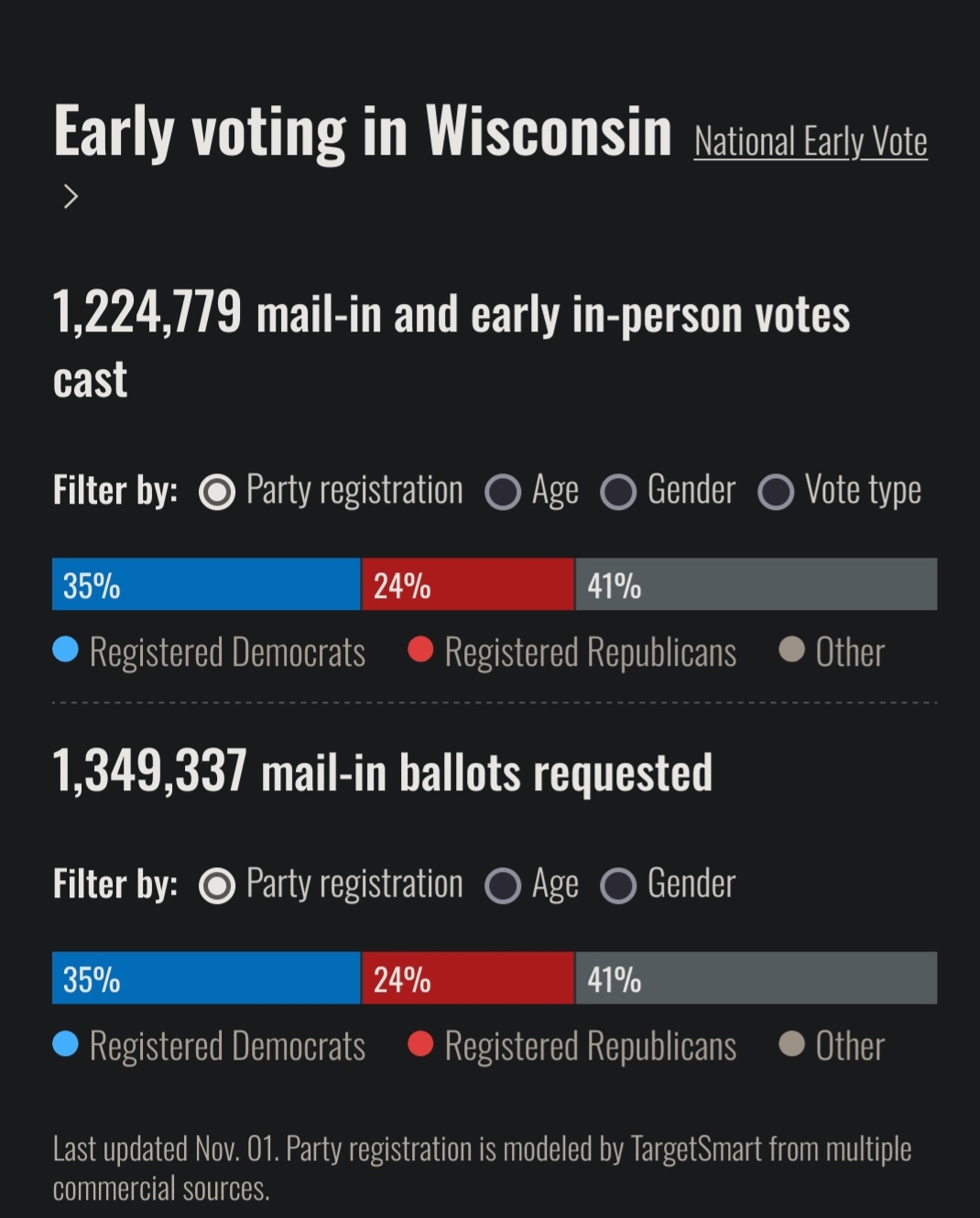Wisconsin doesn’t have party registrations as part of voter registration (we used to, back when I first registered, which is likely why there’s some partisan representation, but not for a long time), nor do you need to be registered with a party to vote in the primaries (everything is on one ballot, you can just only vote for one party).
So that huge chunk of “independent” is probably “new” registrations from the last 15 or so years. They just don’t have data because it stopped being a tracked metric.
“other” is the catch all for anyone whose not registered as democrat or republican. It includes independents, yes, but it also includes all the 3rd parties and the people who simply didn’t register one way or other (who might be repub or dem, anyhow).
Depends on the state, when I lived in Florida you had to be registered to a party to vote in their primaries. It varies all over. Some states you get a ballot with all of the names for the people in your party for primaries, some you can choose any member of any party, it shows that the states aren’t really as similar as we think they are, as the laws for most everything vary. Punch someone in one state, it’s a battery charge, in another it’s assault; which you may be able to get for yelling/threatening to hit someone. Get caught with an illegal substance, well the substance list changes by state, the volumes required for charges change, and the consequences vary. What counts as rape, what age you can marry… It goes on and on. Taxes change by city, county, and state.
And people who’ve registered with a party are more likely to be proactive voters. Honestly there’s so many complaicating factors here that trying to interpret this data is folly.
Live Data https://www.nbcnews.com/politics/2024-elections/early-vote
that… 19% of “other” is going to be doing a lot of work here. if we assume they’re 50/50, then I take this as, overall, good news.
I think it’s Independent.
The Wisconsin breakdown is bonkers.
Wisconsin doesn’t have party registrations as part of voter registration (we used to, back when I first registered, which is likely why there’s some partisan representation, but not for a long time), nor do you need to be registered with a party to vote in the primaries (everything is on one ballot, you can just only vote for one party).
So that huge chunk of “independent” is probably “new” registrations from the last 15 or so years. They just don’t have data because it stopped being a tracked metric.
“other” is the catch all for anyone whose not registered as democrat or republican. It includes independents, yes, but it also includes all the 3rd parties and the people who simply didn’t register one way or other (who might be repub or dem, anyhow).
Yes, I am registered as unaffiliated, because I don’t see why the political party I support needs to be publicly accessible.
Depends on the state, when I lived in Florida you had to be registered to a party to vote in their primaries. It varies all over. Some states you get a ballot with all of the names for the people in your party for primaries, some you can choose any member of any party, it shows that the states aren’t really as similar as we think they are, as the laws for most everything vary. Punch someone in one state, it’s a battery charge, in another it’s assault; which you may be able to get for yelling/threatening to hit someone. Get caught with an illegal substance, well the substance list changes by state, the volumes required for charges change, and the consequences vary. What counts as rape, what age you can marry… It goes on and on. Taxes change by city, county, and state.
And people who’ve registered with a party are more likely to be proactive voters. Honestly there’s so many complaicating factors here that trying to interpret this data is folly.
Oh yeah. I don’t for a second believe it’s going to fall out to 50/50 on a perfect split.
Anyone telling you anything except that it’s too close to call, is selling you something.
But let me huff my copium, okay?
deleted by creator